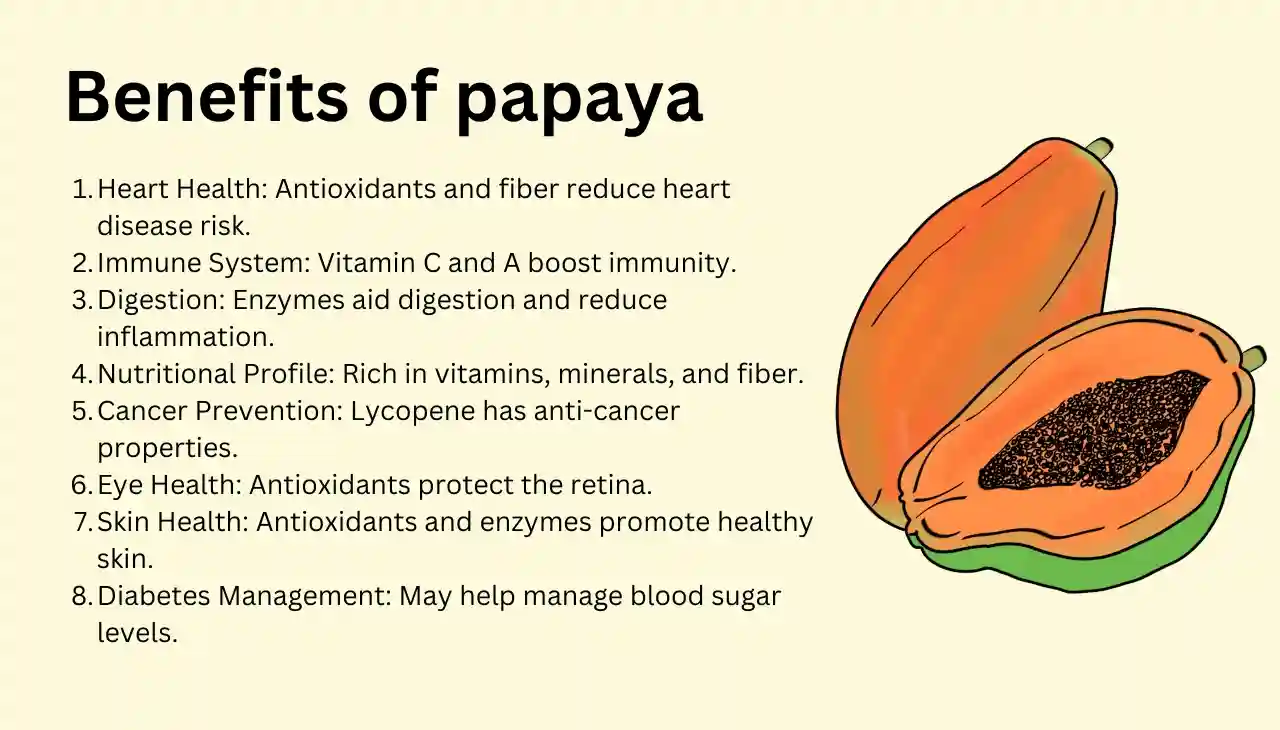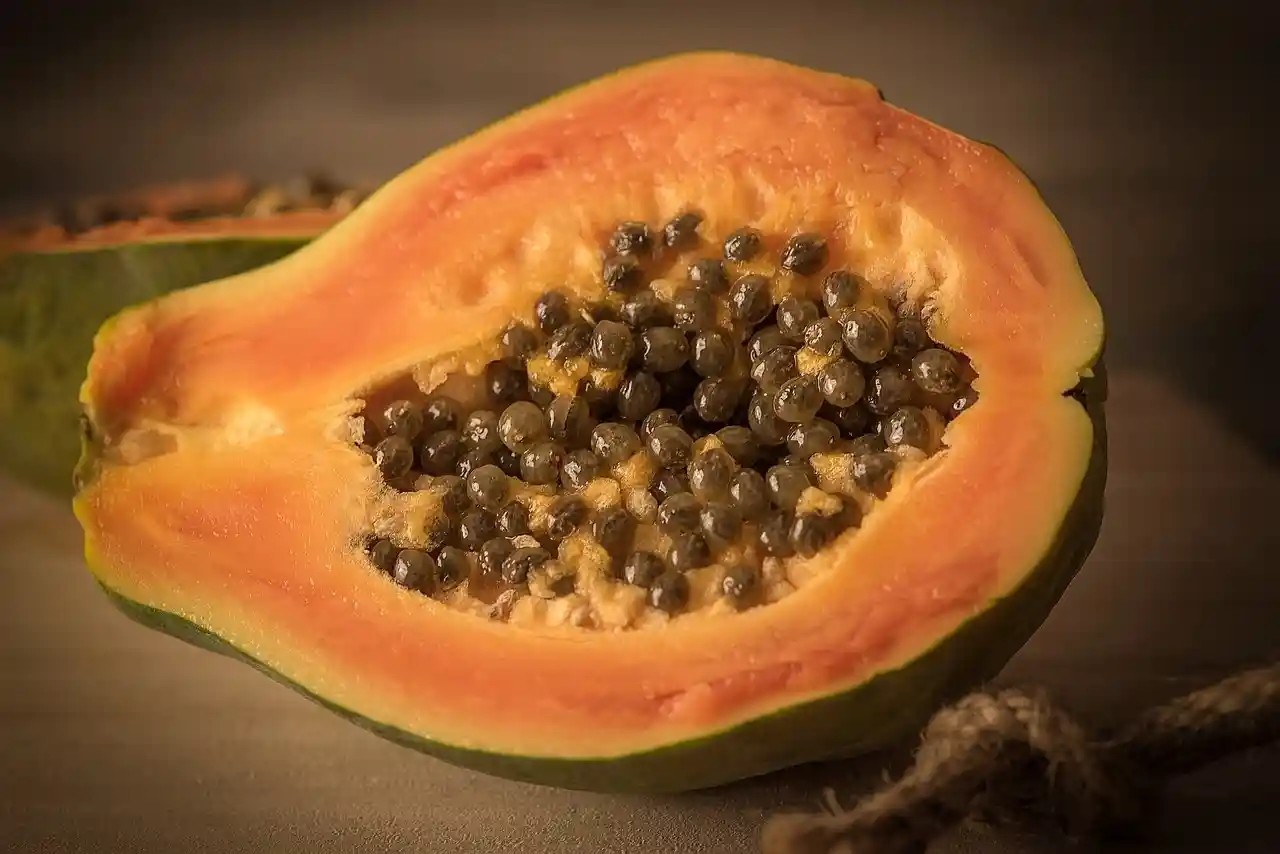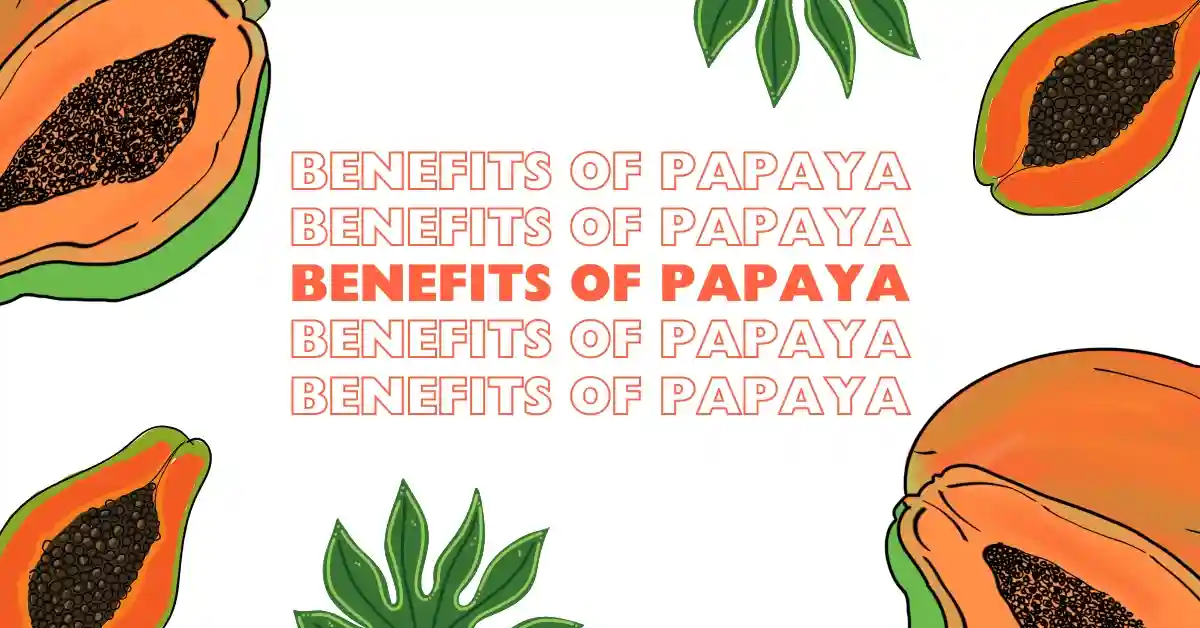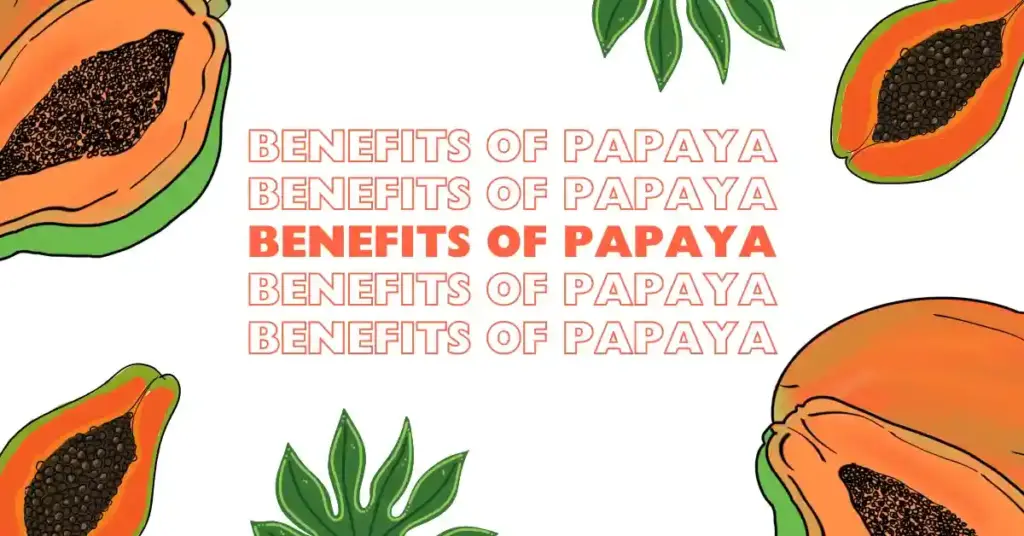Introduction
Imagine biting into a juicy, vibrant fruit that not only tantalizes your taste buds but also nourishes your body from the inside out. Welcome to the world of papaya, a tropical delicacy that packs a serious punch when it comes to health benefits. Often overshadowed by its more popular cousins like mangoes and pineapples, this unassuming fruit deserves a spot in the limelight. Buckle up, folks, because we’re about to embark on a journey through the surprising health benefits of papaya that will leave you craving more.

Papaya nutrition
Papaya is a nutrient-dense fruit that provides several health advantages. Here’s a breakdown of the nutritional value of papaya:
- Calories: A one-cup portion (145g) of raw papaya has around 62 calories.
- Carbohydrates: A serving of papaya has almost 16g of carbs, including around 2.5g of fiber and 11g of naturally occurring sugar.
- Protein: A serving of papayas has less than 1 gram of protein.
- Fat: Papaya has nearly little fat, with each 1-cup serving having less than 0.4 grams.
- Vitamins and Minerals: Papaya is high in vitamin C, with 88.3mg per serving, meeting approximately 100% of the daily need. It is also a good source of vitamin A, notably the pigment lycopene, and has 263.9mg of potassium and 53.7mcg of folate per serving.
Papaya has a glycemic index of 60 and a glycemic load of 9, making it a moderate option for blood sugar control.
Papaya is a fat-free and nutrient-dense source of healthful carbohydrates, including fiber. It contains a lot of vitamin C (98% of the daily required amount), potassium, and vitamin A. Because of their rich nutrient content, papayas provide health advantages for the entire body, including powerful antioxidant vitamins that keep your cells healthy and safe from harm.
Remember that, while nutritional content might be helpful, the best way to be healthy is to eat a diverse diet rich in fruits, vegetables, whole grains, lean meats, and healthy fats. To get the various health advantages of papaya, incorporate it into a well-balanced diet!
Top 10 health benefits of papaya
Papaya is a tropical fruit that not only tastes great but also has a number of health advantages. Below are the top ten health advantages of papaya:
- Rich in Nutrients: Papayas are high in vitamins C and A, fiber, and beneficial plant components. They also contain papain, an enzyme that assists in the digestion of proteins.
- Powerful Antioxidant Effects: Papayas include antioxidants such as carotenoids and lycopene, which can neutralize damaging free radicals and perhaps lower the risk of numerous illnesses.
- May Have Anticancer Properties: According to some research, chemicals found in papaya, such as lycopene and zeaxanthin, may have anticancer properties.
- Heart Health: Papaya’s nutrients may help prevent heart disease by lowering blood cholesterol levels and decreasing inflammation.
- Digestive Health: Papaya contains papain, an enzyme that can aid in protein breakdown and digestion. It’s also high in fiber, which is good for your intestinal health.
- Anti-Inflammatory: Papaya may help decrease inflammation in the body, which is associated with a variety of chronic conditions.
- Eye Health: Papaya includes chemicals such as lutein and zeaxanthin, which can protect the eyes and perhaps prevent age-related macular degeneration.
- Skin Health: Papaya contains vitamin C and lycopene, which can help preserve your skin and prevent the effects of aging.
- Improved Immunity: Papaya has high quantities of vitamin C, which helps improve your immune system and help you fight infections and diseases.
- Asthma Prevention: A higher consumption of specific nutrients present in papaya, such as carotenes, lycopene, and zeaxanthin, is associated with a decreased risk of getting asthma.
Remember that, while papaya is a healthy addition to your diet, it is preferable to consume a variety of fruits and vegetables to ensure a well-rounded vitamin intake. To get these health advantages, include papaya in your balanced diet.

Papaya benefits for female
Papaya is a fruit with several health advantages, especially for women.
- Digestive Health: Papaya includes the enzyme papain, which promotes digestion and can help treat bloating, constipation, and gas.
- Immunity Boost: Papaya’s high vitamin C concentration boosts the immune system, protecting the body against infections and illnesses.
- Skin Care: Papaya is high in antioxidants such as beta-carotene, vitamin C, and flavonoids, which can help fight free radical damage and promote youthful, beautiful skin. The enzyme papain also assists in exfoliation by removing dead skin cells.
- Heart Health: papaya is not only delicious but also packed with fiber, potassium, and antioxidants? These amazing nutrients can help regulate blood pressure, lower cholesterol levels, and reduce the risk of heart disease.
- Menstrual Health: Papaya can help regulate the menstrual cycle and relieve menstruation discomfort, therefore it is good for women’s reproductive health.
- Weight Management: Papaya is a low-calorie, high-fiber food that is an ideal complement to a weight-management diet. It makes you feel full and pleased, which reduces the possibility of overeating.
- Eye Health: Papaya contains beta-carotene and vitamin A, which are vital for excellent vision and avoiding age-related macular degeneration.
- Hair Health: Vitamin A in papaya is essential for healthy hair development. Regular ingestion helps strengthen hair follicles and develop glossy, luscious hair.
Including papaya in your diet may be a great way to get the health advantages. Remember to eat a variety of fruits and vegetables to ensure a balanced nutritional intake.
Benefits of papaya for skin
Papaya is an excellent skin care fruit, providing several advantages due to its high vitamin, mineral, and enzyme content. Here are some of the primary benefits of papaya for your skin:
- Acne Control: Papaya contains proteolytic enzymes called papain and chymopapain, which help decrease inflammation and can aid with acne treatment by exfoliating dead skin cells that clog pores.
- Wrinkle Reduction: Papaya contains antioxidants such as lycopene, which combats free radical damage and helps maintain your skin smooth and young. Papaya may also enhance skin suppleness and reduce the appearance of wrinkles.
- Deep Cleansing: Papaya’s enzyme, papain, thoroughly cleanses the skin by eliminating pollutants and dead skin cells.
- Skin Diseases Treatment: Papaya has shown promise in healing skin diseases including warts, corns, and eczema.
- Moisturization: The fruit moisturizes the skin and is especially good to persons with dry skin.
- Pigmentation Reduction: Regular papaya consumption can help reduce skin pigmentation and lighten dark spots.
- Facial Hair Treatment: Papaya may be used to naturally remove unsightly face hair.
- Dark Spots Treatment: Applying papaya to the skin may help alleviate dark patches and other types of hyperpigmentation.
- Collagen Production: Papaya promotes collagen formation, which is essential for skin suppleness and health.
- Nourishment: Papaya contains vitamins A, C, E, and antioxidants that nourish the skin, slowing the aging process and keeping it looking healthy.
There are several methods to include papaya into your skincare routine, including applying fresh papaya pulp straight to the skin or utilizing products containing papaya extract. Always test any new component on a tiny area of your skin to avoid an adverse response.

Benefits of eating papaya at night
Eating papaya at night may be a healthy decision with various advantages:
- Promotes Better Digestion: Papaya contains the enzyme papain, which assists in protein breakdown, so improving digestion and perhaps avoiding discomfort and indigestion.
- Enhances Sleep Quality: Papaya includes tryptophan, which stimulates the creation of serotonin and melatonin, neurotransmitters that govern sleep cycles.
- Supports Weight Management: Papaya, with its low calorie and high fiber content, can keep you satisfied while also aiding in fat breakdown.
- Boosts Immune Function: Papaya’s strong vitamin C content strengthens the immune system against sickness.
- Supports Heart Health: Papaya contains potassium, which helps to maintain healthy blood pressure levels, as well as antioxidants that prevent oxidative stress and inflammation.
- Improves Skin Health: Papaya’s vitamins and antioxidants might help you have better skin.
Including papaya in your nightly routine might be a great way to get these health advantages. Remember to eat a variety of fruits and vegetables to ensure a balanced nutritional intake.
Papaya benefits for men
Papaya is a healthy fruit that provides several health advantages, particularly for males.
- Rich in Antioxidants: Papaya contains antioxidants such as vitamin C, beta-carotene, and lycopene, which help neutralize free radicals in the body and lower the risk of chronic illnesses.
- Supports Digestive Health: Papaya contains the enzymes papain and chymopapain, which help digestion by breaking down proteins and encouraging good gut function.
- Boosts Immunity: Papaya’s strong vitamin C concentration can help improve the immune system, making men less prone to infections and diseases.
- Promotes Heart Health: Papaya has heart-healthy elements such as potassium and fiber, which can help manage blood pressure, cholesterol levels, and lower the risk of heart disease.
- Improves Skin Health: Papaya contains vitamin C and vitamin E, which promote collagen formation, resist oxidative stress, and reduce the appearance of wrinkles.
- Supports Eye Health: Papaya contains beta-carotene, which is good for eye health by lowering the risk of age-related macular degeneration and increasing eyesight.
- Aids Weight Loss: Papaya is low in calories but high in fiber, making it an excellent fruit for weight management since it promotes satiety and aids digestion.
- Enhances Hair Health: Papaya has elements that help strengthen hair follicles, encourage hair growth, and prevent hair loss. These nutrients include vitamin A and folate.
- Anti-Inflammatory Properties: The enzymes and phytochemicals in papaya contain anti-inflammatory properties that can decrease inflammation in the body, so alleviating pain and suffering.
Including papaya in your diet may be a great way to get the health advantages. Remember to eat a variety of fruits and vegetables to ensure a balanced nutritional intake.

Benefits of papaya during pregnancy
Papaya, especially when ripe, may be a nutritious addition to a pregnant diet, providing various advantages.
- Rich in Vitamins: Ripe papaya contains vitamins A, C, and E, as well as folate, all of which are beneficial to the mother’s and baby’s health.
- High in Fiber: It provides dietary fiber, which can help avoid constipation, a frequent problem during pregnancy.
- Boosts Immunity: Ripe papaya contains a high antioxidant content, which helps enhance the immune system.
However, it is vital to highlight that unripe papaya should not be consumed during pregnancy. Unripe papaya contains latex, which can trigger uterine contractions and lead to issues including premature childbirth. Unripe papaya contains the enzyme papain, which is a worry since it may weaken crucial membranes that sustain the fetus.
To be safe, pregnant women should only eat mature papaya with yellow skin and avoid green, unripe fruit. If you have any concerns or special health issues, you should always contact your doctor before changing your diet while pregnant.
Overall health benefits of papaya
Papaya Nutritional Powerhouse
- High in Vitamin C: One cup of diced papaya provides 88% of the recommended daily vitamin C intake.
- Antioxidant Extravaganza: Papaya is rich in lycopene, vitamin A, and flavonoids, which neutralize free radicals and reduce the risk of chronic diseases.
- Fiber Fiesta: Papaya is loaded with both soluble and insoluble fiber, promoting healthy bowel movements and promoting long-lasting fullness, aiding in weight management.
Papaya’s Heart Health Impact
- Helps in reducing chronic inflammation, a silent killer, contributing to heart disease.
- Potent anti-inflammatory compounds like papain and chymopapain soothe inflammation, lowering heart-related problems.
- Promotes blood pressure and cholesterol control with its unique blend of nutrients.
- Enzymes in papaya may help lower “bad” LDL cholesterol, promoting a healthy heart.

Enhanced Immunity of Papaya for Health
- Vitamin C in papaya supports the immune system and aids in white blood cell production.
- Papain enzyme aids in digestion and nutrient absorption, promoting a healthy gut.
- Vitamin C and antioxidants combat free radicals, promoting collagen production and skin protection.
- Papaya may have cancer-fighting properties, especially in colon and prostate cancers, due to its antioxidants and anti-inflammatory compounds.
Unveiling the Health Benefits of Papaya Leaves, Seeds, and Other Lesser-Known Parts
- Papaya leaves are often overlooked, but they contain powerful compounds like flavonoids, alkaloids, and phenolic acids.
- Papaya leaf extract is used to treat various ailments and may have liver-protective properties.
- Papaya seeds are loaded with beneficial compounds like enzymes, antioxidants, and fatty acids.
- They can be dried and ground into a powder, added to smoothies, juices, or savory dishes for extra nutrition.
- Some suggest using papaya seed extract as a natural remedy for parasite infections.
- Various parts of the papaya plant, including the sap, root, and leaves, have been used in traditional medicine for centuries.
Incorporating Papaya into Your Diet
- Carica papaya is the most common variety of papaya, ranging from green to reddish-orange.
- Different types of papaya exist, each with unique flavor profiles.
- Hawaiian papaya, also known as the “Rainbow” papaya, is renowned for its sweet, candy-like taste and reddish-orange flesh.
- Mexican papaya, smaller but intensely sweet and aromatic, is smaller but packs a punch.
- Papaya can be enjoyed in a variety of ways, from smoothies and juices to salads and savory dishes.
- For breakfast, try blending diced papaya with Greek yogurt, orange juice, and honey.
- For lunch, try a papaya salad with shredded cabbage, carrots, and lime-chili dressing.
- For a caramelized treat, grill or roast papaya slices.
Choosing and Preparing Papaya for Maximum Enjoyment and Nutrient Retention
- Ripeness is crucial in selecting the perfect papaya. A ripe papaya should be soft to the touch and vibrant yellow or reddish-orange. Avoid overly green or hard papaya.
- Unripe papaya should be handled with care due to its compound called papain, which can cause digestive irritation.
- Proper storage is essential for maximum freshness. Whole papayas should be kept at room temperature until ripe, then transferred to the refrigerator. Diced or sliced papaya can be stored in an airtight container in the fridge for up to a week.

Incorporating Papaya into Your Lifestyle
- Papaya’s health benefits include aiding digestion, reducing inflammation, alleviating pain, and supporting wound healing.
- The enzyme papain, found in papaya skin, can be consumed for its potential to tenderize meats and break down tough fibers.
- The seeds of papaya are believed to contain enzymes, antioxidants, and antimicrobial compounds.
- More research is needed to fully understand the safety and efficacy of consuming papaya seeds, especially in large quantities.
- Start small by sprinkling ground-up seeds over dishes or smoothies.
Disadvantages of eating papaya
While papaya is often regarded as having various health benefits, it, like any other food, can have negative consequences when ingested in excess or under specific circumstances. Here are some of the downsides of eating papaya.
- Pregnancy Concerns: Unripe papaya has high levels of latex, which can trigger uterine contractions and be dangerous to pregnant women, perhaps leading to miscarriage or early childbirth.
- Digestive Issues: Although papaya is recognized for its digestive benefits, excessive ingestion can cause bloating, gas, and upset stomach. The fruit’s skin contains latex, which can irritate and cause pain in the stomach.
- Allergic Reactions: Some people may be allergic to papaya or its enzyme, papain, resulting in itching, rashes, swelling, dizziness, and headaches.
- Medication Interference: Papaya may interact with some drugs, particularly blood thinners, resulting in easy bleeding and bruising.
- Blood Sugar Impact: Fermented papaya has the potential to substantially reduce blood sugar levels, which can be problematic for diabetics, particularly those on medicines.
- Kidney Stones Risk: Due to its high oxalate level, excessive papaya eating may raise the chance of getting kidney stones.
- Respiratory Allergies: In rare situations, eating papaya might trigger respiratory allergies or aggravate pre-existing illnesses.
It’s crucial to consume papaya in moderation and to be aware of any personal health issues or allergies. If you are pregnant, have a medical condition, or are on medication, you should always speak with your doctor before making substantial dietary changes.
Conclusion
The vibrant papayas, a tropical powerhouse, offer a wide range of health benefits, including vitamin C, antioxidant content, enzymes, and anti-inflammatory compounds. These health-boosting properties are derived from the plant’s leaves and seeds, which are often overlooked. Papayas are a versatile addition to any healthy diet, supporting the immune system and heart health. Embrace the tropical treasure and make papaya a staple in your journey towards better health and vitality.
FAQs:
Can papaya interact with any medications?
Yes, papaya may interact with certain medications, particularly those used for blood thinning or controlling blood sugar levels. The enzyme papain found in papaya can potentially increase the effects of blood thinners like warfarin, while the fruit's high fiber content may impact the absorption and effectiveness of some diabetes medications. It's always best to consult with your healthcare provider if you're taking any medications and plan to consume papaya regularly.
Is it safe to eat papaya while pregnant?
Ripe papaya is generally considered safe for consumption during pregnancy when eaten in moderation. However, unripe or semi-ripe papaya contains high levels of latex and the enzyme papain, which can potentially cause uterine contractions and increase the risk of miscarriage. Pregnant women are advised to avoid consuming unripe papaya and to check with their healthcare provider regarding appropriate serving sizes for ripe papaya.
Can papaya cause any allergic reactions?
While relatively rare, some individuals may experience allergic reactions to papaya. Symptoms can range from mild skin rashes or itching to more severe reactions like difficulty breathing or anaphylaxis. People with latex allergies may be at a higher risk of reacting to papaya due to the presence of certain cross-reactive proteins. If you experience any adverse reactions after consuming papaya, it's best to avoid it and consult with an allergist or healthcare professional.
Is it better to eat papaya with or without the seeds?
Both options have their own advantages or benefits. Eating papaya with the seeds allows you to consume the additional nutrients and compounds found in the seeds, such as enzymes, antioxidants, and potential antimicrobial properties. However, the seeds can have a slightly bitter taste and may cause digestive discomfort for some individuals. If you prefer the taste without the seeds or have concerns about their potential effects, it's perfectly fine to remove them before consuming the fruit.
Can papaya help with weight loss?
While papaya itself is not a magic weight loss solution, it can be a helpful addition to a balanced diet for weight management. Papaya is low in calories but high in fiber, which can promote feelings of fullness and satiety, potentially reducing overeating. The fruit's enzyme papain may also aid in digestion and nutrient absorption. However, sustainable weight loss ultimately comes from maintaining a calorie deficit through a combination of a healthy diet and regular physical activity.




